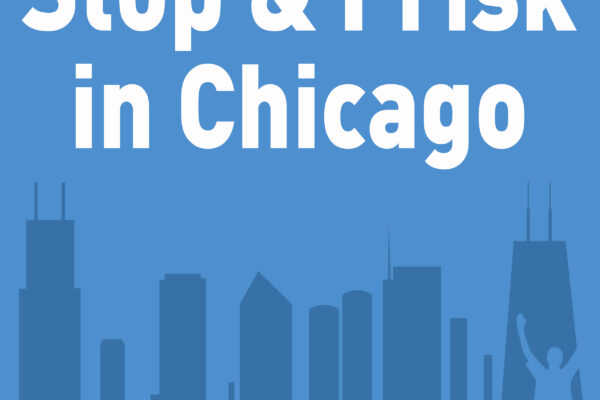Agreement includes independent evaluation of CPD practices and procedures, additional data collection by CPD, heightened training for officers, and increased transparency; Independent consultant will report to public twice annually on stops and searches by CPD
CHICAGO – In a landmark agreement between the Chicago Police Department (CPD), the City of Chicago, and the American Civil Liberties Union of Illinois (ACLU), there will be an independent evaluation of the practices and procedures, and increased transparency and public disclosure regarding Chicago police investigatory stops. These stops (which may be accompanied by pat downs or searches) have been the focus of public discussion since March of 2015, when the ACLU issued a report raising concerns about the legality and constitutionality of the practice on Chicago streets.
Today’s agreement is the result of months of negotiation between the City, CPD and ACLU, which began after the ACLU issued its report in March. Rather than engage in expensive, time-consuming, and burdensome litigation, the parties agreed to discuss the outlines of a legally enforceable agreement, without the prior filing of a formal lawsuit. After careful discussions about the subject, the City, CPD and the ACLU were able to agree on a series of concrete steps designed to ensure (and confirm) that CPD policies and practices related to “investigatory stops and protective pat downs” comply with all laws, as well as the U.S. Constitution.
“When we issued our report a few months ago, it included a series of recommendations for change by the Chicago police,” said Harvey Grossman, legal director for the ACLU in announcing the agreement. “This agreement incorporates the bulk of those recommendations, and reflects the types of agreements that have been reached in other communities only after a long, protracted period of investigation and litigation. What we have done here is move past the litigation process and advanced directly to a collaborative process, to insure that stops on Chicago streets meet constitutional and legal standards.”
"As the men and women of the Chicago Police Department work to make our city safer and identify the small subset of individuals who torment our neighborhoods with violence, it is imperative that we use every tool and resource in a way that is not only lawful but respectful of the residents we serve,” said Chicago Police Superintendent Garry F. McCarthy. “We believe policing in Chicago must be strictly based on crime data, patterns, statistics and community intelligence, and this unprecedented agreement with the ACLU is a demonstration of CPD’s commitment to fairness, respect, transparency, and underscores our willingness to work side by side with everyone as we work toward our shared goal of keeping our neighborhoods safe."
A key part of the agreement is the engagement of former U.S. Magistrate Judge Arlander Keys to evaluate the City’s practices and procedures regarding investigatory stops and to oversee the agreements implementation. Judge Keys will produce public reports twice each year on investigatory stops and pat downs by Chicago police, assessing whether the CPD is complying with its legal requirements, including the Fourth Amendment requirement that there be reasonable suspicion of criminal conduct as a basis for a stop or search and that the stops do not have an impermissible racially-disparate impact prohibited by the Illinois Civil Rights Act. Judge Keys also is authorized to make recommendations for changes to CPD policies.
Under the agreement, the City and CPD will collect additional data about all investigatory stops in the City of Chicago. Judge Keys will use this data to determine if the City’s practices are lawful. The data to be collected will include name and badge number of the officer, the race/ethnicity of the person stopped, the gender of the person stopped, all the reasons for the stop, the location, date and time of the stop, whether or not a pat down resulted from the stop (along with the reason for the pat down), whether contraband was discovered and what happened as a result of the stop (including an arrest, warning, or no action at all).
The agreement also calls for heightened training of officers, designed to ensure that investigatory stops in Chicago are conducted only where there is reasonable suspicion of criminal activity and that protective pat downs are performed only when legally justified. The training will be followed up by quarterly or semi-annual audits by CPD and can lead to re-training, enhanced supervision or discipline of officers who engage in unlawful stops and pat downs or who violate CPD procedures.
All of the data collected by CPD is to be shared with the ACLU and with the outside Consultant, Judge Keys. Beginning in 2016, Judge Keys and his staff will review the data collected by CPD, conduct a thorough analysis of the data, along with policies, procedures and training practices of CPD. Public reports will be issued twice a year that assess the practices of investigatory stops in Chicago. Judge Keys can then make recommendations for changes in CPD policy and training. Judge Key’s independent reports will provide transparency and an assessment of the effectiveness of policy changes in the CPD
“This agreement relies not only on promises but also on specific verification of how CPD officers are interacting with the public on neighborhood streets all across the City,” said Karen Sheley, senior staff counsel at the ACLU. “Judge Keys will provide a clear, concise picture twice each year that police supervisors and advocates can use to make appropriate steps to improve this situation in Chicago. We also hope that the transparency and improved training will increase trust and understanding between the CPD and communities.”
The agreement announced today goes into effect immediately.
Learn More:
- View the agreement (PDF)
- Read the one-page summary about the settlement (PDF)
- Read the report: Stop and Frisk in Chicago
Media Coverage
- Chicago Tribune: ACLU, Chicago police agree to changes on controversial street stops
- Chicago Sun-Times: Chicago Police and ACLU agree to major changes in stop-and-frisk policy
- Associated Press: Chicago police OK independent stop-and-frisk evaluations
- CBS Chicago: Chicago Police, ACLU Agree On Changes To Controversial “Stop And Frisk” Tactics
- ABC 7 Chicago: CPD Agrees to "Stop-and-Frisk" Reforms, Avoids ACLU Lawsuit
- USA Today: Chicago police and ACLU agree to stop-and-frisk safeguards
- UPI: Chicago police agree to ACLU evaluation of stop-and-frisk
- WBEZ: Morning Shift: August 7, 2015
- Huffington Post: Chicago Police Department Agrees To Reform Stop-And-Frisk Procedures In Settlement With ACLU
- Christian Science Monitor: Chicago police place tighter controls on 'stop-and-frisk' policy
Documents
Stay Informed
Sign up to be the first to hear about how to take action.
By completing this form, I agree to receive occasional emails per the terms of the ACLU’s privacy statement.
By completing this form, I agree to receive occasional emails per the terms of the ACLU’s privacy statement.


